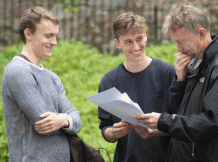
David will study physics at Worcester College, following Daniel, who is studying mathematics and statistics at Oriel College and Rob, who is studying chemistry at Jesus College
Students at the South West’s unique school for talented mathematicians achieve outstanding results
Students at the South West’s unique school for talented mathematicians have achieved some of the best A-level results in the country – setting them on the path towards becoming the much-needed engineers and scientists of the future.
More than ten per cent of students at the Exeter Mathematics School will attend either Oxford or Cambridge to study degrees, including mathematics, computer science, physics and engineering.
This year 62 per cent of examinations taken by teenagers at the school, which is sponsored by the University of Exeter and Exeter College, were graded at A or A* and 82 per cent were graded at A*, A or B. The students will now attend the best universities in the country after two years of studying a rigorous academic curriculum, including undergraduate-standard work.
The Exeter Mathematics School, which opened in 2014, is one of only two “free” schools for enthusiastic young mathematicians and scientists in England. The sixth form offers young people in the South West who show potential to do well in STEM subjects the chance to study in an exciting and challenging environment, and work with leading academics at the University of Exeter. Students who live too far away to commute daily live together in supervised accommodation during the week.
David Strachan, from Chudleigh Knighton, is the third of three brothers to both get three A* grades and also to go to the University of Oxford. David will study physics at Worcester College, following Daniel, who is studying mathematics and statistics at Oriel College and Rob, who is studying chemistry at Jesus College. Only David has been able to attend the Exeter Mathematics School, as it wasn’t open when his older brothers were studying for their A-levels. David’s father Andrew, an RE teacher, said: “All three boys have worked their socks off in school. They are competitive, but only against themselves.”
David said: “I wasn’t really thinking about the grades I could get, I just focused on revision and working on past papers. It’s amazing my brothers and I have got the same grades. As the youngest I definitely wanted to live up to their achievements and it’s helped a lot to follow in their footsteps and study the same subjects.”
Helena Read, from South Molton, secured three A* grades and is waiting to hear if she has a place at the University of Cambridge to study maths. Ruth Wareham, from Exeter, hopes to work in the space industry and will study physics with particle physics and cosmology at Swansea University.
Ruth said: “I love the theory of physics and I’m really excited to start the course. In the second year we can specialise in astrophysics, so I’m looking forward to that.”
Yannis Wells, from Totnes, got four A* grades and will study pure maths at Trinity College Cambridge. Yannis has competed in maths competitions throughout school and creates puzzles for his friends. He said: “I love doing maths, I enjoy problem solving and how logical it can be.”
Sam Rose, from Dawlish, secured two A* grades and an A and will study civil engineering at the University of Bath. Sam is a keen rugby player, playing for Exeter College and England colleges, and hopes to continue playing while at university.
Beth Womack, from Crewkerne, got three A* grades and will study maths at the University of Warwick. She said: “It’s such a relief to get these results – I couldn’t sleep and sat by the computer refreshing the screen to check I had got my university place.”
Bradley Hempstead, from Somerset, will study aerospace engineering at the University of Surrey and hope to eventually work in the space industry.
Exeter Mathematics School headteacher Kerry Burnham said: “Our students deserve huge congratulations. They have worked hard and made incredible progress to achieve these results. Their determination, willingness to be challenged and their support for one another have paid dividends and we wish them all the best as they move on to their next adventure.”
Professor Janice Kay, Provost and Senior Deputy Vice-Chancellor at the University of Exeter, said: “My congratulations go to all Exeter Mathematics School students on these fantastic results. The school is playing a key role in inspiring the next generation of mathematicians and scientists. This partnership between the University of Exeter, Exeter College and the brilliant teachers at the Exeter Mathematics School has led to a unique and exciting curriculum which challenges students and nurtures their mathematic and scientific ability.”
All students at the school, which is also sponsored by Exeter College, study at least three A-levels, in mathematics, further mathematics and physics or computer science, and may take a fourth subject at Exeter College. Students also study for the Exeter Mathematics Certificate, a separate qualification designed to prepare pupils for independent study and the world of work. Students work with academics to research a question or problem posed by lecturers and professors and present their answer to hundreds of people at lectures hosted by the University of Exeter. They then complete a piece of individual research of their own choosing. This year two students have secured places to study at the University of Exeter.
Leading on from the success of Exeter Mathematics School and the other specialist maths school in the country at King’s College London, the Department for Education announced earlier this year the intention to develop a new network of specialist post-16 mathematics schools to boost skills. Exeter Mathematics School and the University of Exeter are pleased to be working with the Department for Education and King’s College London to develop this approach, which will multiply the benefits of specialist mathematics schools for the next generation.
Date: 16 August 2018
